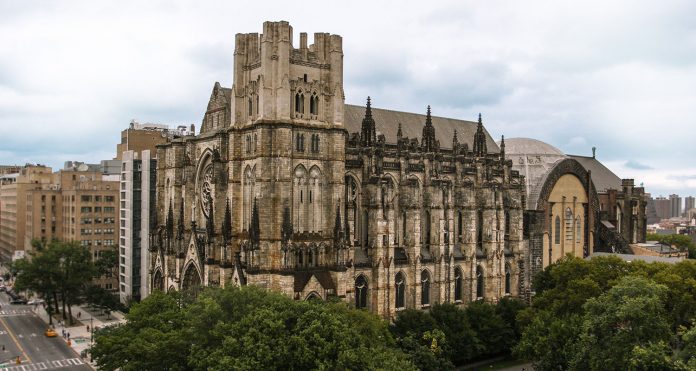From early Christians to modern scientists, the concept that humankind is created in the image of God provided a foundation for the Christian philosophy of human dignity. The idea that our species was “created male in female in the image of God” gave centuries of civil activism and struggle for justice moral weight. Now, in the wisdom of the postmodern era, theological liberals have zeroed in on this historic truth as an alleged vehicle of bigotry and sexism.
We live in an era where a massive cathedral apse, built for the worship of God, is lit in rainbow colors where panelists sat to discuss the struggle for sexual liberation — undermining years of historical church thinking.
On Monday, June 5, the Episcopal Cathedral of St. John the Divine hosted a Faith Perspectives Panel examining the intersection of religion and the LGBTQ+ movement as part of the Cathedral’s Iconic Pride celebration. The panel featured Episcopal priest the Rev. Dr. Mary Barber, Church of England clergy the Rev. Dr. Charlie Bell, Union Theological Seminary professor and Episcopal priest the Rev. Dr. Patrick Cheng, controversial Roman Catholic cleric the Rev. James Martin, and was moderated by the Cathedral Dean the Rev. Dr. Patrick Malloy.
The panel discussion centered around deconstructing the “binary view” of the church. The panelists accused the church of historically placing one binary above the other, arguing that this fuels the patriarchy. Instead of being allies, Chen claimed, “As a church, we’ve got to put this front and center.”
Panelists supposed that the problem was rooted in intersectionality and power differentials. “[The] failure to pay attention to the power differential is where we go wrong… we are just repeating the errors of the past with another group of people,” Bell claimed, hinting at the church’s historical mistreatment of minority groups. “It was the legacy of colonialism that put some of these anti-gay views into the country,” Barber added. She then discussed the church’s historical unkindness to women—emphasizing the church’s use of mostly male images of God.
When discussing Genesis 1:27, Bell presumed that “Male and female he created them” refers to the entirety of creation. He argued that humanity should not be subscribed into an easy binary. “We misuse and we manipulate scripture to make the point that we wish it was making rather than recognizing what [the] passage [is] actually telling us, and actually it’s saying male and female and everything in between he created them,” Bell claimed.
Barber argued that the Hebrew word for God was the same word used for small deities; therefore, all people might resemble God—regardless of size, shape, ability, and color. “If we allow God to still speak to us through trans people… that can open up our image of God,” said Barber. Bell then encouraged listeners to approach the scriptures with an open mind. “When trans folk read ‘in the image of God he created you,’ what does that mean to you? And yet we’re so often willing to tell people what it means to them, and that’s such a dangerous place for us as a church to find ourselves.”
All panelists agreed that the LGBTQ+ community belongs in the church. “We feel a call from God to be there and be a bit awkward,” Bell explained, adding that “we want to be involved in a faith community… LGBTQ people are entitled to have a spiritual life.”
How should the church respond? First, the church should hold true to its promises. In the end, the Church will win. This promise is not to any nation or denomination but to the Church as a whole.
“It may not be my church that wins, but the Church is going to win. That helps provide a certain amount of stability to us as Christians,” Grove City College professor of Biblical and Religious Studies Dr. Carl Trueman has said. This charge may seem naively optimistic; however, as Christians, we must be people of hope, not optimism.
In a more practical sense, the church should treat its opposition fairly by understanding and accurately representing their views. As Trueman said, “if we simply answer strawmen, then we’re not going to persuade them.”
Furthermore, the church must teach believers basic, holistic, theological skills. Thus, when confronted with arguments labeling our beliefs as hatred, we are prepared to engage with our adversaries on a theological level. When engaging in the political sphere, we need to understand the faith, which requires knowledge found beyond memorizing scripture.
Finally, remember the words of 1 Peter 3:15-17:
“In your hearts honor Christ the Lord as holy, always being prepared to make a defense to anyone who asks you for a reason for the hope that is in you; yet do it with gentleness and respect, having a good conscience, so that, when you are slandered, those who revile your good behavior in Christ may be put to shame. For it is better to suffer for doing good, if that should be God’s will, than for doing evil.”
Episcopalians in New York State have been hard-hit by membership and attendance decline, with the Diocese of New York reporting significant losses across the past two decades.
Between 2005 and 2021, the Episcopal Diocese of New York declined from 64,027 members to 45,112 members, a loss of 18,915 members (-30%). During the same time period, average Sunday attendance dropped from 21,723 in 2005 to 6,945 in 2021, a loss of 14,778 attendees (-68%). Baptisms in the diocese declined from 1,612 in 2005 to 431 in 2021 (-73%) and marriages performed decreased from 579 in 2005 to 136 in 2021 (-77%). (A table of statistics from 2021 parochial reports can be accessed here).
The panel recording can be found here.










